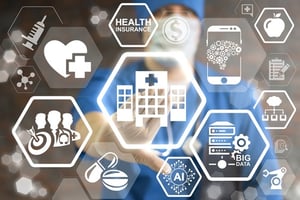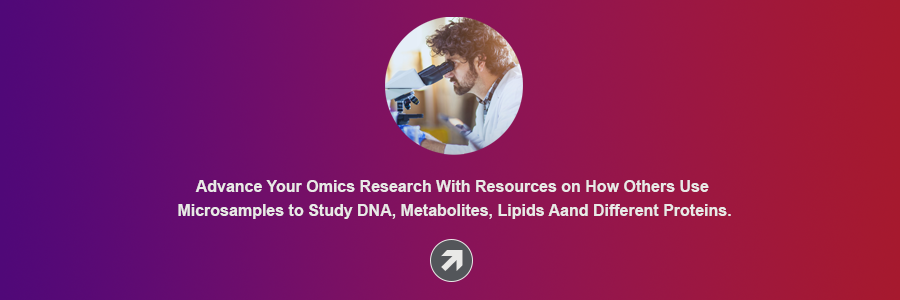Share this
smarter healthcare: how microsampling may transform science and medicine
by Neoteryx Microsampling on Nov 26, 2018 5:38:00 AM
 Technology is changing everything in our world, especially healthcare. Scientists and healthcare professionals are working with new gadgets in more modern facilities that are wired for digital health, and even artificial intelligence (AI) — all aimed at making healthcare better, or smarter, than ever.
Technology is changing everything in our world, especially healthcare. Scientists and healthcare professionals are working with new gadgets in more modern facilities that are wired for digital health, and even artificial intelligence (AI) — all aimed at making healthcare better, or smarter, than ever.
Advancements such as microsampling have made the process of blood collection easier and more comfortable. In many cases, remote microsampling devices can be used by patients and study participants at home to replace traditional methods of venipuncture.
/2022%20Mitra%20Lifestyle%20Images%20(approved)/collection-clamshell-home.jpeg?width=389&height=227&name=collection-clamshell-home.jpeg) Through microsampling, patients can collect their own blood samples at home, away from clinics and waiting rooms. Microsampling can be done as a remote process for blood collection at home, at work, or at school.
Through microsampling, patients can collect their own blood samples at home, away from clinics and waiting rooms. Microsampling can be done as a remote process for blood collection at home, at work, or at school.
When a person refers to "getting blood work done" they typically envision visiting a lab or blood draw center where a phlebotomist will poke them in the arm with a needle to draw several tubes or vials of blood. The traditional venipuncture blood draw can cause stress and anxiety.
 Remote microsampling, however, is a quick and minimally invasive process that can happen in virtually any comfortable setting with a simple finger-prick or arm-prick. The microsampling approach to blood collection may soon replace the traditional blood draw experience in a lab or clinic.
Remote microsampling, however, is a quick and minimally invasive process that can happen in virtually any comfortable setting with a simple finger-prick or arm-prick. The microsampling approach to blood collection may soon replace the traditional blood draw experience in a lab or clinic.
Here are some other groundbreaking innovations that are shaping the future of healthcare.
3D Organ Printing
With high-tech 3D printing, there is the possibility of creating not only drugs and prosthetics but also human organs and tissues. These organs and tissues will bring very exciting solutions and treatments for diseases, including chronic ones.
In the area of organ transplants, patients will be able to receive bioartificial organs needed for transplant instead of adding their names to a long waiting list of people hoping to receive human organs from donors. For instance, Vanderbilt University has an ongoing project to develop a bioartificial kidney for transplant.
Telemedicine & Decentralized Care
People who need medical care may be living in inaccessible areas or cannot easily travel to city centers to access healthcare services. Recent technological advancements have the potential to improve accessibility in these cases.
One of these advancements is telemedicine, which enables a virtual exchange of information between the patients and their medical providers. The providers may be able to ship out portable health kits and wearable devices for patients to use at home. These may include point-of-care devices for monitoring blood pressure, oxygen levels, heart rate, and more. Many of these devices will automatically send patient data to doctors via digital communications systems. Telemedicine enables the doctors to use phone calls, emails and video conferencing to monitor and treat their patients. This decentralized approach to healthcare will not only save on the cost of commuting but will maximize on patients’ comfort.
Health Information Technology
Clinics and hospitals are now adopting electronic information-keeping and doing away with the traditional paper record-keeping and hardcopy patient files. This is improving and streamlining the healthcare process. Doctors can easily trace the history of patients’ illnesses and treat them accordingly. This will reduce the inconsistencies in healthcare service, making the process easier for the doctors and patients alike.
Human Genomic Information
The treatment of some chronic diseases is gaining great benefits from the genetic sequencing of the patients. Personalized medicine is becoming a reality thanks to more advanced genetic information that enables doctors to determine the specific type of medication or treatment to apply for a particular patient, which brings more improved outcomes.
There is more to be hopeful about in the field of medicine as technology continues to advance, taking us closer to smarter healthcare.
Microsampling is just one example of what to look forward to in the coming years. Learn more here:

Image Credits: Trajan, Neoteryx, Shutterstock
Share this
- Microsampling (206)
- Research, Remote Research (119)
- Venipuncture Alternative (105)
- Clinical Trials, Clinical Research (83)
- Mitra® Device (73)
- Therapeutic Drug Monitoring, TDM (51)
- Dried Blood Spot, DBS (39)
- Biomonitoring, Health, Wellness (30)
- Infectious Disease, Vaccines, COVID-19 (24)
- Blood Microsampling, Serology (23)
- Omics, Multi-Omics (21)
- Decentralized Clinical Trial (DCT) (20)
- Specimen Collection (18)
- Toxicology, Doping, Drug/Alcohol Monitoring, PEth (17)
- Skin Microsampling, Microbiopsy (14)
- hemaPEN® Device (13)
- Preclinical Research, Animal Studies (12)
- Pharmaceuticals, Drug Development (9)
- Harpera Device (7)
- Industry News, Microsampling News (5)
- Antibodies, MAbs (3)
- Company Press Release, Product Press Release (3)
- Environmental Toxins, Exposures (1)
- July 2025 (1)
- May 2025 (1)
- April 2025 (2)
- December 2024 (2)
- November 2024 (1)
- October 2024 (3)
- September 2024 (1)
- June 2024 (1)
- May 2024 (1)
- April 2024 (4)
- March 2024 (1)
- February 2024 (2)
- January 2024 (4)
- December 2023 (3)
- November 2023 (3)
- October 2023 (3)
- September 2023 (3)
- July 2023 (3)
- June 2023 (2)
- April 2023 (2)
- March 2023 (2)
- February 2023 (2)
- January 2023 (3)
- December 2022 (2)
- November 2022 (3)
- October 2022 (4)
- September 2022 (3)
- August 2022 (5)
- July 2022 (2)
- June 2022 (2)
- May 2022 (4)
- April 2022 (3)
- March 2022 (3)
- February 2022 (4)
- January 2022 (5)
- December 2021 (3)
- November 2021 (5)
- October 2021 (3)
- September 2021 (3)
- August 2021 (4)
- July 2021 (4)
- June 2021 (4)
- May 2021 (4)
- April 2021 (3)
- March 2021 (5)
- February 2021 (4)
- January 2021 (4)
- December 2020 (3)
- November 2020 (5)
- October 2020 (4)
- September 2020 (3)
- August 2020 (3)
- July 2020 (6)
- June 2020 (4)
- May 2020 (4)
- April 2020 (3)
- March 2020 (6)
- February 2020 (3)
- January 2020 (4)
- December 2019 (5)
- November 2019 (4)
- October 2019 (2)
- September 2019 (4)
- August 2019 (4)
- July 2019 (3)
- June 2019 (7)
- May 2019 (6)
- April 2019 (5)
- March 2019 (6)
- February 2019 (5)
- January 2019 (8)
- December 2018 (3)
- November 2018 (4)
- October 2018 (7)
- September 2018 (6)
- August 2018 (5)
- July 2018 (8)
- June 2018 (6)
- May 2018 (5)
- April 2018 (6)
- March 2018 (4)
- February 2018 (6)
- January 2018 (4)
- December 2017 (2)
- November 2017 (3)
- October 2017 (2)
- September 2017 (4)
- August 2017 (2)
- July 2017 (4)
- June 2017 (5)
- May 2017 (6)
- April 2017 (6)
- March 2017 (5)
- February 2017 (4)
- January 2017 (1)
- July 2016 (3)
- May 2016 (1)
- April 2016 (2)


No Comments Yet
Let us know what you think